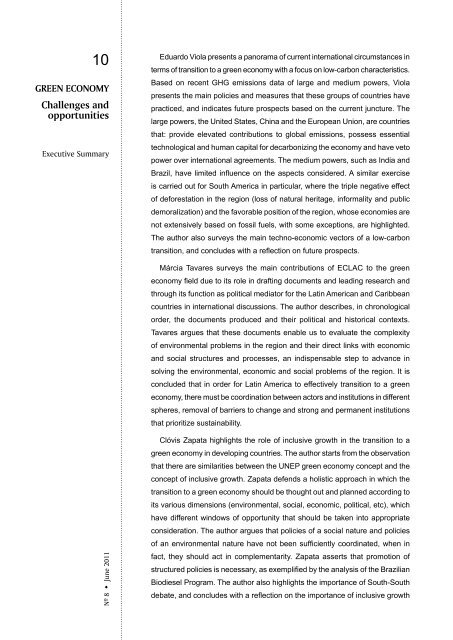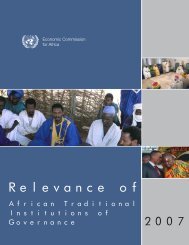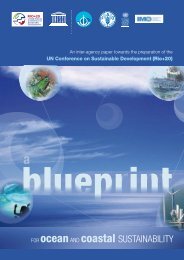Download Publication - Rio+20
Download Publication - Rio+20
Download Publication - Rio+20
You also want an ePaper? Increase the reach of your titles
YUMPU automatically turns print PDFs into web optimized ePapers that Google loves.
10<br />
GREEN ECONOMY<br />
Challenges and<br />
opportunities<br />
Executive Summary<br />
Eduardo Viola presents a panorama of current international circumstances in<br />
terms of transition to a green economy with a focus on low-carbon characteristics.<br />
Based on recent GHG emissions data of large and medium powers, Viola<br />
presents the main policies and measures that these groups of countries have<br />
practiced, and indicates future prospects based on the current juncture. The<br />
large powers, the United States, China and the European Union, are countries<br />
that: provide elevated contributions to global emissions, possess essential<br />
technological and human capital for decarbonizing the economy and have veto<br />
power over international agreements. The medium powers, such as India and<br />
Brazil, have limited influence on the aspects considered. A similar exercise<br />
is carried out for South America in particular, where the triple negative effect<br />
of deforestation in the region (loss of natural heritage, informality and public<br />
demoralization) and the favorable position of the region, whose economies are<br />
not extensively based on fossil fuels, with some exceptions, are highlighted.<br />
The author also surveys the main techno-economic vectors of a low-carbon<br />
transition, and concludes with a reflection on future prospects.<br />
Márcia Tavares surveys the main contributions of ECLAC to the green<br />
economy field due to its role in drafting documents and leading research and<br />
through its function as political mediator for the Latin American and Caribbean<br />
countries in international discussions. The author describes, in chronological<br />
order, the documents produced and their political and historical contexts.<br />
Tavares argues that these documents enable us to evaluate the complexity<br />
of environmental problems in the region and their direct links with economic<br />
and social structures and processes, an indispensable step to advance in<br />
solving the environmental, economic and social problems of the region. It is<br />
concluded that in order for Latin America to effectively transition to a green<br />
economy, there must be coordination between actors and institutions in different<br />
spheres, removal of barriers to change and strong and permanent institutions<br />
that prioritize sustainability.<br />
Nº 8 • June 2011<br />
Clóvis Zapata highlights the role of inclusive growth in the transition to a<br />
green economy in developing countries. The author starts from the observation<br />
that there are similarities between the UNEP green economy concept and the<br />
concept of inclusive growth. Zapata defends a holistic approach in which the<br />
transition to a green economy should be thought out and planned according to<br />
its various dimensions (environmental, social, economic, political, etc), which<br />
have different windows of opportunity that should be taken into appropriate<br />
consideration. The author argues that policies of a social nature and policies<br />
of an environmental nature have not been sufficiently coordinated, when in<br />
fact, they should act in complementarity. Zapata asserts that promotion of<br />
structured policies is necessary, as exemplified by the analysis of the Brazilian<br />
Biodiesel Program. The author also highlights the importance of South-South<br />
debate, and concludes with a reflection on the importance of inclusive growth

















